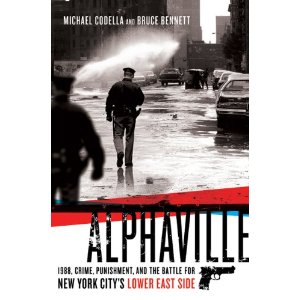Alphaville: 1988, Crime, Punishment, and the Battle for New York City’s Lower East Side
Michael Codella and Bruce Bennett
By
Jesse Kornbluth
Published: Mar 31, 2011
Category:
Non Fiction
The Hare With Amber Eyes is now available in paperback. You can still be among the first in your zip code to read it — and then press it on others.
And now, just because, a book for "guys"….and the women who love them….
==========
When you see the bankers who cratered the global economy being driven around in shiny black cars, do you want to make a citizen’s arrest?
Do you find that you’re watching more “Law & Order” reruns these days?
Do you miss “The Wire”?
Are you getting antsy waiting for a new book from Richard Price?
If you’ve had it up to here with law and disorder and need a fix of street-level policing, you’re the dream reader of “Alphaville: 1988, Crime, Punishment, and the Battle for New York City’s Lower East Side,” by Michael Codella, a retired New York detective, and his street-smart ghostwriter, Bruce Bennett. It’s got real-life cops. Real-life perps. And, in a rough-and-tumble Manhattan neighborhood, some Hollywood-worthy chases and arrests. (To buy the book from Amazon, click here. For the Kindle edition, click here.)
It’s 1988. Michael — who will come to be known on the street as “Rambo” — and his partner Gio are part of a plainclothes task force focused on hard drugs in “the retail heroin capital of the world.” Michael’s grandfather, a Sicilian immigrant, hooked up with other Sicilians, none of them model citizens. His father was a housing cop. So he knew how to play the game.
Still, the Lower East Side is an eye-opener:
After dumping some stuff in my locker, I decided to take a drive around my new beat. What I saw was shocking. Even though it was January and one of the coldest days so far that year, there were dope deals taking place on nearly every corner I passed. Junkies and dealers shivered together, exchanged dope and money and parted company. A group of users followed one after the other into an abandoned building lobby being used as a “toilet” or a designated spot to shoot up indoors.
Some busts are easy. A guy goes into his local bodega, toting an Uzi and wearing a ski mask. He gets the cash, but he also gets recognized. When the cops burst into his apartment, the Uzi and his haul are on the bed.
Soon, however, the word comes down: “Do not make street drug sale arrests.” The new plan: work up the chain, find the bosses and wholesalers, break the drug business from the top. Or, simply, nail Davey Blue Eyes, the current Mr. Big — “half Italian, half Puerto Rican, project born and raised.” Davey is powerful, feared and completely elusive. How careful is he? His armored van has a periscope.
There’s great inside stuff here. An Uzi is a bitch to aim. Lazy cops tend to gravitate to teaching jobs at the academy. A guy picks a blackened bottle cap off the sidewalk because he knows someone used it to cook up heroin. One of the mottos of the Hell’s Angels: “When in Doubt, Knock It Out.” Junkies you arrest in the morning are more likely to be cooperative. Undercover cops carry different-colored bandanas, and the color of the day is announced in every precinct so uniform cops don’t accidentally shoot their comrades.
And great big perceptions too. “Helping out and a knock-around good time went hand in hand.” If you want to make quality arrests, you have to bend the rules. “Ed Koch had the politician’s gift for one-way communication down to a science.”
The biggest perception is almost a throwaway: “Making drug collars on the Lower East Side could feel like you were emptying the ocean with a soup ladle.” They never get Davey. But the neighborhood changes, and the dealers retreat.
The writing is vivid, and you do feel you’re on the job with Michael Codella. Some readers will resent that he and his partner cross many lines in the interest of making arrests and, even more, getting convictions. Chalk that up to naivete on the part of those readers. And consider that these cops don’t seem to have been “dirty” — that is, they didn’t take money or sell drugs. Then compare them to unindicted Wall Street bankers who dramatically enriched themselves through fraud…..
If you’re like me, books like this make you think of the pointlessness of so much of the drug interception effort. The United States has a higher percentage of its young men in prison than any other country — well, except for China. And most of them are there for drugs
Jailing dealers is a very big expense — much costlier, for example, than treating heroin strictly as a sickness. And I’m not just talking about heroin and cocaine, which are big bad drugs and thus merit long sentences, especially to African-American and Hispanic defendants. I also mean marijuana, that white middle class high. Did you know New York City alone spends $75 million on low-grade marijuana arrests each year?
Sanity says we might do better to legalize all kinds of drugs, regulate their sale and treat addicts as people with medical problems. Insanity says we keep sending hard-working cops into urban hellholes and make them arrest an ever-changing quota of dealers and users.
One day, perhaps, we’ll get sane. I hope it’s in Michael Codella’s lifetime, and that he has grandchildren, and that when they ask him to share a story, he tells some of these tales. They’re great and colorful. And most, I think, are even true.


